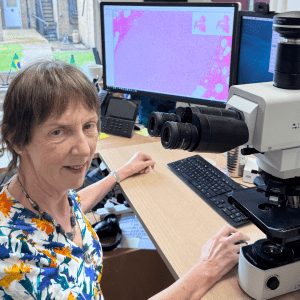
Sarcoma UK is delighted to share that it is contributing £50,000 to a major national research project, harnessing the power of AI to streamline sarcoma diagnosis. Building on previous research funded by Sarcoma UK, the project aims to develop a bespoke artificial intelligence (AI) based network to help diagnose sarcoma more quickly and more accurately.
Sarcomas are hugely challenging to diagnose, with over 100 different subtypes. Getting the right subtype diagnosis ensures that patients can receive a treatment most suitable for them. But a process this complex requires time, and importantly, specialist pathologists to make the correct diagnosis. But the number of pathologists available to provide this specialist expertise is set to decline. AI could bring faster diagnosis, more accurate prognosis, and quicker access to the right treatments.
“An AI-based model will help reach a diagnosis more quickly, using fewer resources, expense, and staff time,” says lead investigator, Prof. Adrienne Flanagan. “If we could reduce diagnosis time by 10% minimum – and I think we could reduce it significantly more – the labs wouldn’t be so exhausted, pathologists would be able to think about making better diagnoses, and there would be more money to do all of this.”
During the project, backed by Sarcoma UK and other charities to the tune of £1 million, the team will teach the existing deep learning models to recognise patterns in sarcoma tissue samples that even experienced pathologists might miss. “We’re aiming to scan two decades’ worth of images from multiple NHS trusts,” Prof Flanagan explains. “The AI tool will then be tested by running prospective sarcoma cases through the model.”
AI is already yielding benefits in other cancer types like prostate cancer, and the team hope to be able to translate this success to sarcoma. AI won’t replace human expertise, but will augment it, allowing pathologists to work more efficiently and focus their skills where they’re most needed. For example, the algorithm can also suggest relevant diagnostic tests that pathologists can run to confirm a suspected diagnosis.
“I see doctors working together with AI in terms of making it better,” she says. This collaboration between human insight and machine learning could be the key to unlocking new levels of diagnostic accuracy. “The algorithm could pick out areas which they think is abnormal and cancer-like, even the very small areas which the pathologist might overlook.”
There are certainly challenges ahead. AI could have a huge impact in streamlining the diagnostic process, but it requires thousands of data and images to get there. “For AI, you need big numbers of everything,” Prof. Flanagan explains. “Sarcoma is somewhat disadvantaged as it’s a rare disease with multiple subtypes.”
In the long term, investment in this project will provide a unique resource for future research and training of sarcoma pathologists.
“I think the value and the impact will accelerate”, says Prof Flanagan. “If we have scanned, say 30,000 different cases, they’re all available for multiple other studies in the future for grading, for outcome, for responses to treatment. What we’re doing at the moment is not just trying to give a product which is the classifier, but we are also building a resource which can be exploited for the next 50 years.”
Director of Research, Policy and Support at Sarcoma UK, Dr Sorrel Bickley, says: “At Sarcoma UK, we’re enthusiastic about the potential of AI to transform the approach to these rare and complex cancers. The prospect of swifter, more precise diagnoses could significantly improve patient experiences, potentially leading to earlier interventions and enhanced outcomes. We’re pleased to support this groundbreaking work and look forward to witnessing how it may reshape sarcoma care in the years to come.”
Read more: Building an AI network for faster sarcoma diagnosis: https://sarcoma.org.uk/research/building-an-ai-network-for-faster-sarcoma-diagnosis/









